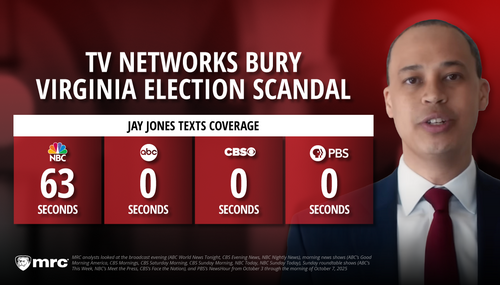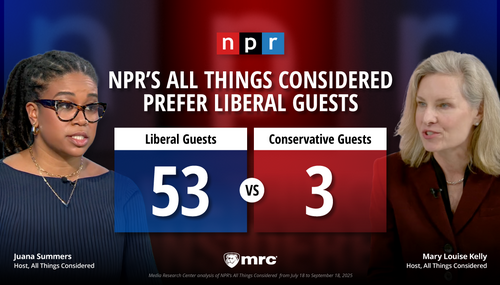Roll Call, the newspaper that covers Capitol Hill, featured a video of Missouri Senator Claire McCaskill playing the race card on the Senate floor about the vote to confirm Loretta Lynch for Attorney General. And she wasn’t alone in getting this kind of attention - attention that was manifestly filled with flat-out untruth.
In this story by Roll Call’s David Hawkings back on March 12th, Hawking’s column was headed this way: "Republican Opposition to Lynch Might Make History."
Hawkings wrote: “Lynch is on course to be confirmed this month after the longest wait ever for a nominee to be attorney general…”
When Lynch was confirmed on April 23rd, Roll Call’s Steve Dennis wrote that “the scars from the long, tortured confirmation process will linger far longer.” Dennis also made a point of quoting Vermont Senator Patrick Leahy as saying “Lynch has had to wait longer than any other attorney general nominee, and the Senate was making history for all the wrong reasons.”
Not to mention that in that same article on Lynch’s confirmation vote Roll Call had a video front and center of Missouri Senator Claire McCaskill on the Senate floor, her rant on Lynch’s vote described this way:
“[It] doesn’t get any uglier than this,” railed Sen. Claire McCaskill, D-Mo., shortly before the vote. McCaskill, a former prosecutor herself, said the new precedent being set by Republican opponents is not that someone be qualified for the job, but that they disagree with the president who has nominated them.
“It is beyond depressing. It’s disgusting,” she said. “She is a prosecutor’s prosecutor. She’s prosecuted more terrorists than almost anyone on the planet.”
Not to put too fine a point on all of this but what Roll Call is about here is spreading absolute, flat untruths. Bunk.
Let’s recall the truth.
 On January 23, 1984, President Ronald Reagan nominated White House Counsellor Edwin Meese -- like Loretta Lynch a former prosecutor -- to be Attorney General of the United States. Unlike Loretta Lynch, Mr. Meese had also served as a member of the President’s Cabinet as that White House Counsellor as well as a member of the National Security Council. But no matter Meese’s qualifications - the Left launched a massive campaign to defeat his nomination.
On January 23, 1984, President Ronald Reagan nominated White House Counsellor Edwin Meese -- like Loretta Lynch a former prosecutor -- to be Attorney General of the United States. Unlike Loretta Lynch, Mr. Meese had also served as a member of the President’s Cabinet as that White House Counsellor as well as a member of the National Security Council. But no matter Meese’s qualifications - the Left launched a massive campaign to defeat his nomination.
Wrote Reagan biographer Steven F. Hayward of the moment Meese was nominated (in Hayward’s book The Age of Reagan: The Conservative Counterrevolution 1980-1989):
“The entire hive of liberal activist groups, 165 in all, erupted to oppose Meese’s confirmation, led by the ACLU ….Common Cause, the National Organization for Women, and the NAACP. …
The Left peddled every vicious rumor and charge imaginable, hoping something would stick.”
Vicious was right. At one point the fight was so brutal it was noted in the media that Mrs. Meese was spotted sitting at her husband's hearing -- weeping. The Senate Democrats of the day “seized upon allegations of financial irregularities and influence peddling to derail Meese’s nomination.” The charges were trumped up - completely political. But Democrats succeeded in getting an independent counsel to investigate Meese.
The investigation came up empty, and by the end of the summer Democrats found the issue turned on them with a GOP demand to investigate the finances of the Democratic vice-presidential nominee, Congresswoman Geraldine Ferraro, as a result of her husband’s business deals. Ferraro was finally exonerated by the House Ethics Committee -- and with the independent counsel’s investigation of Meese coming up empty, finally, Hayward writes, “the campaign against Meese collapsed.” Elapsed time for Meese’s stalled confirmation? Almost 400 days. Thirteen months.
It took 13 months - almost 400 days - for Ed Meese to be confirmed.
Lynch’s waiting time - 166 days - wasn’t even half of the time Senate Democrats held up Meese.
In other words? What Roll Call is saying - and again that quote from Hawkings was “Lynch is on course to be confirmed this month after the longest wait ever for a nominee to be attorney general…” was flatly untrue. When the paper reports that Senator Leahy - who, like Biden, was another ring leader in the Meese lynch mob - says: “Lynch has had to wait longer than any other attorney general nominee” ? Quoting Leahy without noting in some fashion that the distinguished Senator from Vermont was uttering - no other way to say it - a bold lie? Not exactly a comforting standard.
When Roll Call features that video of Claire McCaskill bluntly playing the race card by clearly implying that because Loretta Lynch is a black woman she is being treated differently than would a white male? This is so egregiously untrue one can only look on slack-jawed at the paper’s acquiescence in this kind of appalling rewriting of history.
And while we’re on the topic of injecting race into this nomination? Don’t forget that Washington Post story by Sari Horwitz (who by the way, is married to an Obama appointee) headlined: "Race creeps into debate over stalled nomination for attorney general."
Horwitz began her story by saying:
“African American and other civil rights leaders infuriated over the stalled confirmation vote on Loretta E. Lynch, the first black woman to be nominated for attorney general, are casting the delay as an issue with racial overtones.”
There was not a single reference in her story to the role of race in the Meese nomination. As the New York Times noted of Meese’s nomination at the time “Congress's 21 black members were quick to declare their opposition to him.” The NAACP followed, as Hayward noted. Which is to say, both the Congressional Black Caucus and the NAACP played the race card with Meese on the spot, before the nominee ever got close to a Senate confirmation hearing. Neither the Black Caucus nor the civil rights activists of the day had the slightest hesitation in demanding that Meese be defeated outright - and they used the race card to pressure senators of the day to string his nomination out as long as they could do it, hoping to avoid a final confirmation vote.
One would think that both Roll Call and The Washington Post -- not to mention Senator McCaskill -- would know this. Alas, apparently they weren’t interested in either finding out the facts or simply thought it better to ignore the facts.
What really went on with the Lynch nomination was nothing but the latest in media double standards when it comes to attorney general nominations and serving attorneys general. Meese served in 1980 as a campaign adviser for then-candidate Reagan. The Times also reported when Meese was nominated that then-Senator Biden was concerned that Meese’s campaign role had made him “too political a figure” to be attorney general. Meese, the Times made a point of saying in quoting Biden, was a “controversial political operative.” This said, mind you, from a senator who made much of the fact that Robert F. Kennedy -- JFK’s 1960 campaign manager-turned-attorney general -- was one of his heroes.
(Indeed, three years after Meese’s nomination, Biden would be forced to withdraw from his own presidential campaign after it was revealed he was such an RFK fan he had plagiarized a speech from Bobby Kennedy. To think Biden had no idea RFK was every bit the “political operative” as Meese is laughable.)
Roll Call also made a point of McCaskill expressing her disbelief that a nominee could be criticized or blocked for agreeing on the issues with the president who nominated that nominee. This “defies common sense” said McCaskill. Yet once again, that was exactly what Senate Democrats were using as a reason to block Meese. Meese was not only a conservative, he had the audacity to not only agree with Reagan, as a White House aide to Reagan Meese had been, according to the New York Times, “shaping Administration policies.” That was more than reason enough for Senate Democrats of the day to oppose Meese right there - and oppose him they did.
This view wasn’t limited to Ed Meese, either. In a March, 2007 interview on CBS’s Face the Nation, New York Senator Chuck Schumer made a point of saying about then-Bush Attorney General Alberto Gonzales that, in the words of the Times, Gonzales “had shown more interest in carrying out President Bush’s agenda than in upholding the law and protecting the rights of citizens.”
What did Schumer want as the price of Gonzales agreeing with the president whom he served? Yes indeed, Schumer wanted Gonzales to resign. And it it didn’t matter that Gonzales - a Mexican American - was the first Latino to serve as attorney general, either. Was that racism? By the left’s own standards with Lynch apparently so. Take note again of that Schumer criticism: Bush nominee Gonzales “had shown more interest in carrying out President Bush’s agenda than in upholding the law and protecting the rights of citizens.” That was precisely the criticism of Senate conservatives about Loretta Lynch and President Obama.
So what to make of all this nonsense?
The Loretta Lynch nomination battle - and to call it a “battle” is to seriously overstate - was presented to readers of Roll Call as Something New And Really All About Race. In reality? What happened to Loretta Lynch wasn’t new. Ed Meese, white guy, had been there and done that years ago in a battle that really was a battle.
Even if Roll Call wants to pretend it never happened.




